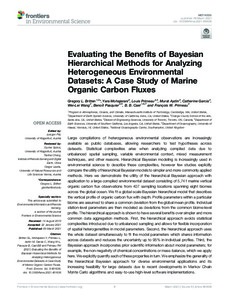Evaluating the Benefits of Bayesian Hierarchical Methods for Analyzing Heterogeneous Environmental Datasets: A Case Study of Marine Organic Carbon Fluxes.

View/
Average rating
votes
Date
2021Author
Britten, Gregory L.
Mohajerani, Yara
Primeau, Louis
Aydin, Murat
Garcia, Catherine
Wang, Wei-Lei
Pasquier, Benoıt
Cael, B. B.
Primeau, François W.
Metadata
Show full item recordAbstract
Large compilations of heterogeneous environmental observations are increasingly available as public databases, allowing researchers to test hypotheses across datasets. Statistical complexities arise when analyzing compiled data due to unbalanced spatial sampling, variable environmental context, mixed measurement techniques, and other reasons. Hierarchical Bayesian modeling is increasingly used in environmental science to describe these complexities, however few studies explicitly compare the utility of hierarchical Bayesian models to simpler and more commonly applied methods. Here we demonstrate the utility of the hierarchical Bayesian approach with application to a large compiled environmental dataset consisting of 5,741 marine vertical organic carbon flux observations from 407 sampling locations spanning eight biomes across the global ocean. We fit a global scale Bayesian hierarchical model that describes the vertical profile of organic carbon flux with depth. Profile parameters with.....
Journal
Frontiers in Environmental ScienceVolume
9Issue
Article 491636Page Range
12pp.Document Language
enEssential Ocean Variables (EOV)
Dissolved organic carbonBest Practice Type
Manual (incl. handbook, guide, cookbook etc)DOI Original
10.3389/fenvs.2021.491636Citation
Britten, G.L., Mohajerani, Y., Primeau, L., et al (2021) Evaluating the Benefits of Bayesian Hierarchical Methods for Analyzing Heterogeneous Environmental Datasets: A Case Study of Marine Organic Carbon Fluxes. Frontiers in Environmental Science, 9: 491636, 12pp. DOI: 10.3389/fenvs.2021.491636Collections
The following license files are associated with this item:
 Repository of community practices in Ocean Research, Applications and Data/Information Management
Repository of community practices in Ocean Research, Applications and Data/Information Management
